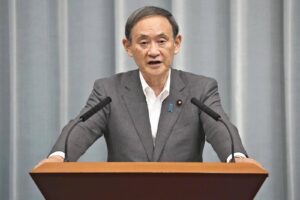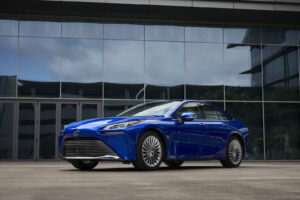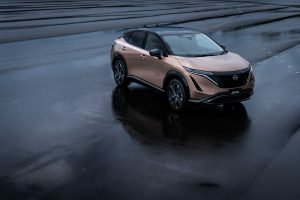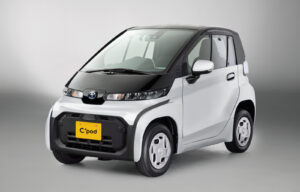
Japanese Prime Minister Yoshihide Suga supports the move to ban the sale of non-electric new vehicles staring in 2035.
Despite strong pushback from the country’s largest automaker, Japan has announced plans to halt the sale of vehicles relying solely on internal combustion engines after 2035.
The move means the Asian nation will join a growing list of countries planning to phase out vehicles powered by gas or diesel, including both the United Kingdom and Norway. A number of other countries, including France and Germany, are considering similar bans.
Vehicles with internal combustion engines won’t be banned entirely. Automakers will still be able to market hybrids in Japan, regulators ruled. Even so, the plan released on Christmas Day was a significant victory for Japanese environmentalists considering it was strongly opposed by key industry leaders, including Toyota President Akio Toyoda who warned earlier this month that a broad shift to electric vehicles could cause the auto industry’s traditional business model “to collapse.”
(Toyota boss Akio Toyoda remains EV skeptic.)
As the head of Japan’s largest and most powerful company – and in his role as the head of the Japan Automobile Manufacturers Association – Toyoda hoped to convince regulators to back off on the proposed ban. But it had widespread backing from other quarters, including Japan’s new Prime Minister Yoshihide Suga.
In October, shortly after assuming his post, Suga had pledged to cut Japan’s carbon dioxide emissions to net zero by 2050 while indicating he supported a shift to battery-powered vehicles.
Global sales of electrified vehicles remain modest, running in single digits in all but a handful of markets, even when including hybrids, PHEVs and fuel-cell vehicles, as well as pure battery-electric vehicles. But demand is expected to increase sharply as key obstacles, such as range, cost and public charging, are addressed. It also will help that scores of new BEVs are scheduled to go into production in the coming years, proponents say.
While Japanese automakers were pioneers with their early push to bring hybrids to market, “Japan is very far behind” in terms of developing more advanced products relying solely on battery power, Masayoshi Arai, an official with the country’s
Ministry of Economy, Trade and Industry, said last week.
Toyota only recently introduced a BEV model in Europe, though it has announced plans to add two more – one through the flagship Toyota division, a second under the Lexus badge. It also this month revealed an all-electric microcar targeting the Japanese home market. Only the Nissan and Mitsubishi brands, among Japanese automakers, have committed significant resources to the development of pure battery-electric vehicles and, even then, they have fallen behind key foreign rivals in terms of bringing new products to market.
(Toyota hopes to boost interest in hydrogen tech with second-generation Mirai.)
Toyota officials have, throughout the years, pointed to numerous concerns about BEVs, including their cost, limited range and other obstacles to widespread consumer acceptance. For his part, company chief Toyoda said this month that he feared a switch to all-electric models would seriously disrupt the classic automotive industry business model. He also raised questions about whether Japan’s electric grid could supply the needed energy — and, if it did add the generating capacity, he warned, that could actually increase the country’s reliance on fossil fuels.

With the debut of the 2021 Mirai fuel-cell vehicle, Toyota’s hoping to spur interest in the tech again.
For his part, Japan’s new prime minister is downplaying such concerns and said that efforts to address greenhouse gas production “should be tackled as a strategy for growth, not as a limitation on growth.”
Downplaying the need for new coal or natural gas plants, the plan released by the Japanese government would add up to 45 gigawatts of new offshore wind generating capacity by 2040.
With the Christmas Day announcement, Japan becomes the second member of the Group of Seven, or G7, to lay out specific plans to ban non-electrified vehicles.
The UK originally had planned to do so by 2040 but now has pushed that target date up to 2030. Like Japan, its ban will continue to permit the sale of hybrids – but only through 2035, at which point only pure, zero-emissions vehicles will be able to be sold in Great Britain. That will include both BEVs and hydrogen fuel-cell vehicles.
A handful of other countries, including Norway, have also laid out ZEV transition plans. So have some states and regions – including California and the Canadian province of British Columbia. A number of cities, such as London, Paris, Berlin and Mexico City, plan to bar vehicles not running in zero-emissions mode, meanwhile. China, meanwhile, has laid out plans to have “New Energy Vehicles,” plug-based models, reach 20% of the market by 2025. It is considering a total ban at a later date.
(Britain to ban sale of all new gas and diesel cars by 2030.)
With most of the country’s automakers reluctant to bring plug-based models to market, demand has grown far more slowly than in many other major regions. The Ministry of Economy, Industry and Trade noted that consumers purchased only 6,000 PHEVs and BEVs during the third quarter of 2020. By comparison, demand tripled in Europe to 270,000 – all-electric models accounting for roughly three-quarters of Norwegian sales. China, meanwhile, is expected to again top 1 million plug-based models for all of 2020.



